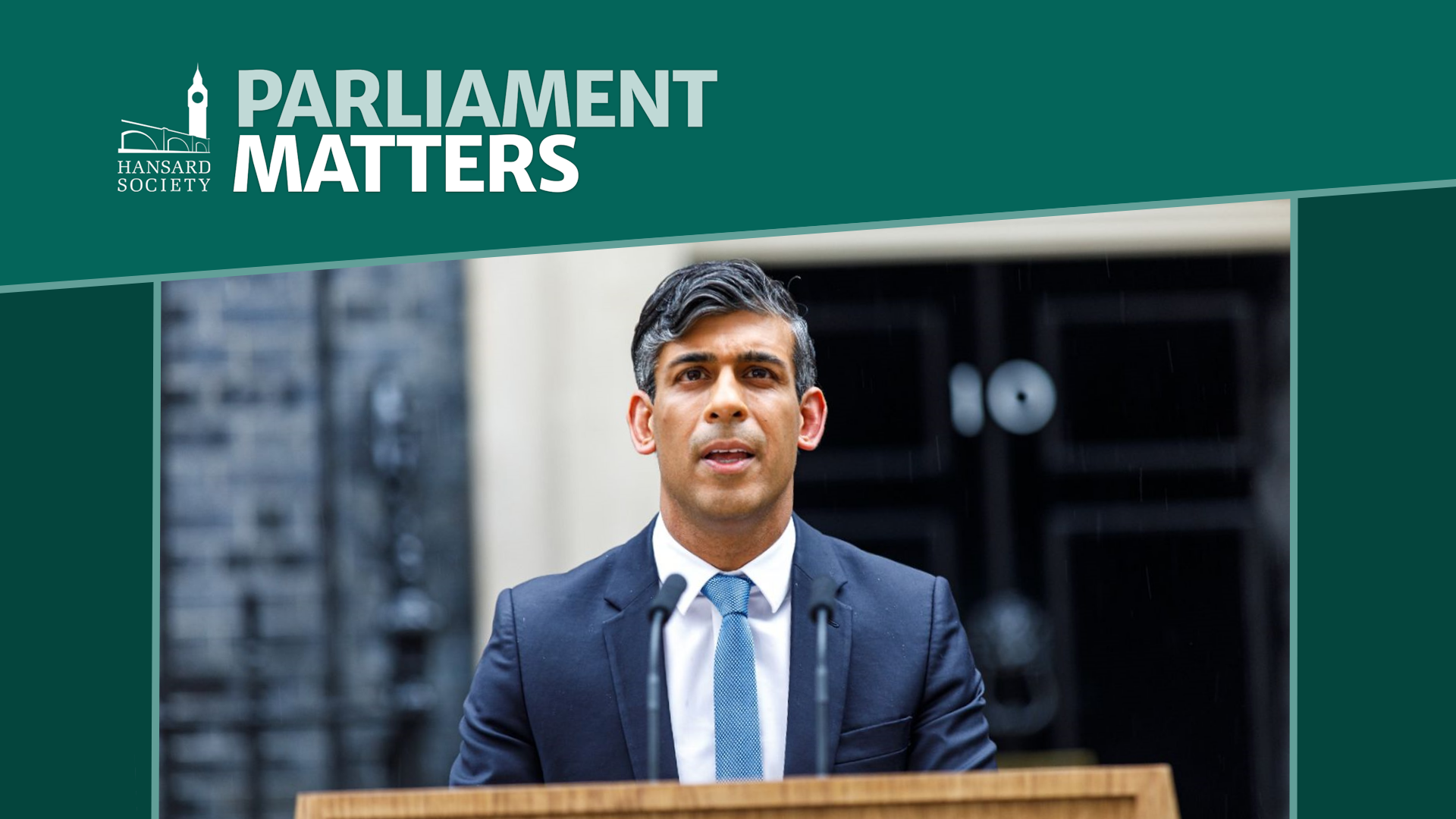00:00:02:07 - 00:00:16:15
You're listening to Parliament Matters, a Hansard Society production, supported by the Joseph Rowntree Charitable Trust. Learn more at hansardsociety.org.uk/pm.
00:00:16:17 - 00:00:39:22
Welcome to Parliament Matters, the podcast about the institution at the heart of our democracy, Parliament itself. I'm Ruth Fox and I'm Mark Darcy. Coming up, Sunak's summer surprise brings the parliament elected in 2019 to an abrupt end. There's a spasm of speed legislating as MPs rushed through as much of the outstanding legislation as they can in just two days.
00:00:39:24 - 00:00:52:06
And both parties want more devolution, more mayors, but how will Parliament keep track of the billions they spend?
00:00:54:17 - 00:01:21:12
But first, Ruth, an asteroid struck planet Westminster this week, Rishi Sunak's almost completely unexpected decision to call an election caught most MPs, most journalists, most commentators, most podcasters, most podcasters, it’s a fair cop, society’s to blame. But here we are suddenly, with a general election and an awful lot of very surprised MPs having to make very rapid decisions about their future.
00:01:21:18 - 00:01:47:10
Quite a number. We're perhaps teetering on the cusp. Will I stay or will I go? Will I try and be in the next Parliament, or will I depart gracefully before the next general election? Have had to come to a very, very swift decision indeed. Names like Jo Churchill, Conservative MP for Bury St Edmunds, Dame Eleanor Laing or the Senior Deputy Speaker, has decided to stand down, which is a little bit of a surprise because she seemed almost in pole position, perhaps, to be the next Conservative speaker of the House.
00:01:47:10 - 00:02:06:09
But after 27 years in Parliament, I think she's now had enough and announced to her constituency that she's going. Another name that's just dropped in the last few minutes, just before we started recording this, Huw Merriman, former chair of the Transport Select Committee, now a transport minister, suddenly announced that he's not going to be standing at this election.
00:02:06:09 - 00:02:32:13
And he's been an MP for, I think, nine years. He's he's not one of the old lags who's been around forever, but he's decided to move on and do other things. And I think there'll be many more decisions of that kind to come on all sides. So a couple of Labour MPs, Yvonne Fovargue, for example, has decided to stand down from her Makerfield seat, which I think she's been in since 2010, and Holly Lynch, shadow deputy chief whip on the Labour side, is also standing down for family reasons.
00:02:32:13 - 00:02:51:11
So I think we'll see over the next couple of days more of some more announcements. They're going to have to make, as you say, the decisions pretty quickly because basically two weeks time close of nominations, all the parties will have to have their candidates signed, sealed and delivered and in with the electoral returning officers. So there's not a lot of time for members to contemplate what they're going to do.
00:02:51:13 - 00:03:10:19
And of course, you know, for those MPs who already made the decision to stand down, some of them were perhaps hoping for a slightly more dignified departure and an opportunity to, you know, make a valedictory speech or finish off some work that they'd been sort of campaigning on. And it's kind of been ripped away. Yeah. No long goodbyes for them.
00:03:10:19 - 00:03:46:17
And some MPs may have discovered, to the horror, that they've already made their final contribution in Parliament and may never get to speak again. And normally it's a much gentler exercise in which, you know, you get a chance to shake hands with the speaker, and a clutch of MPs will go and see the commission that formally prorogue Parliament at the end of a parliament, a sort of weird ritual in the House of Lords, with lots of people in robes doffing cocked hats at various points during a generation in sort of pretend medieval English and all sorts of things like that, or possibly not now happen for them, and instead it'll just be a rather rapid
00:03:46:17 - 00:04:06:15
exercise in packing up the office and never darkening the doors again. Yeah, and of course, we're talking on Thursday, the day after the election has been called. This podcast will be out this episode on Friday morning and Friday was supposed to be, you know, finishing up for a week for the Whitsun recess. MPs had got holidays booked. They’ve got family plans.
00:04:06:15 - 00:04:27:10
Yes, some of them, a lot of them would have been campaigning in the constituency. But I mean, taking a few days break over the bank holiday rather splendidly. Steve Baker, a conservative minister, announced that he was going to have his holiday anyway. But of course, you and I were in the Palace of Westminster yesterday afternoon when the news broke talking to Patrick Grady, the SNP MP who is himself departing.
00:04:27:12 - 00:04:47:19
We were talking to him for a future episode. More about that in the coming weeks. And meeting MPs and in and around the corridors of Westminster was that there was a fair amount sort of quite stunned, frankly. Yeah. I think an awful lot of people struggle to fathom the political reasons, the electoral strategy, if any, behind Rishi Sunak's decision to call an election.






